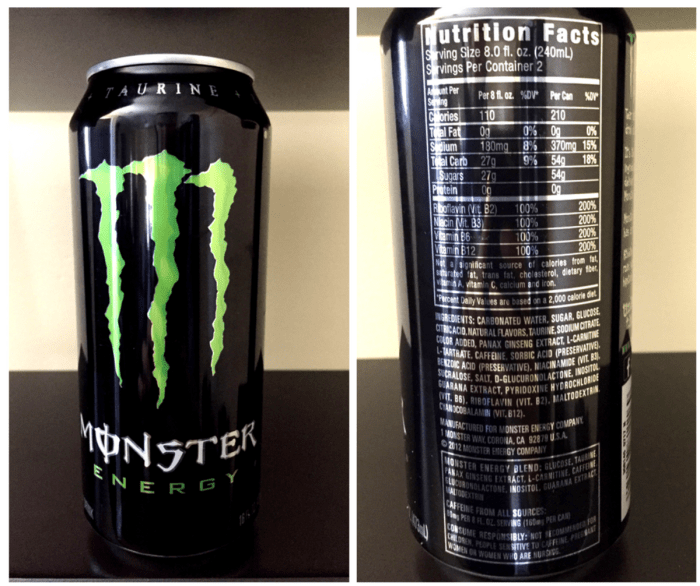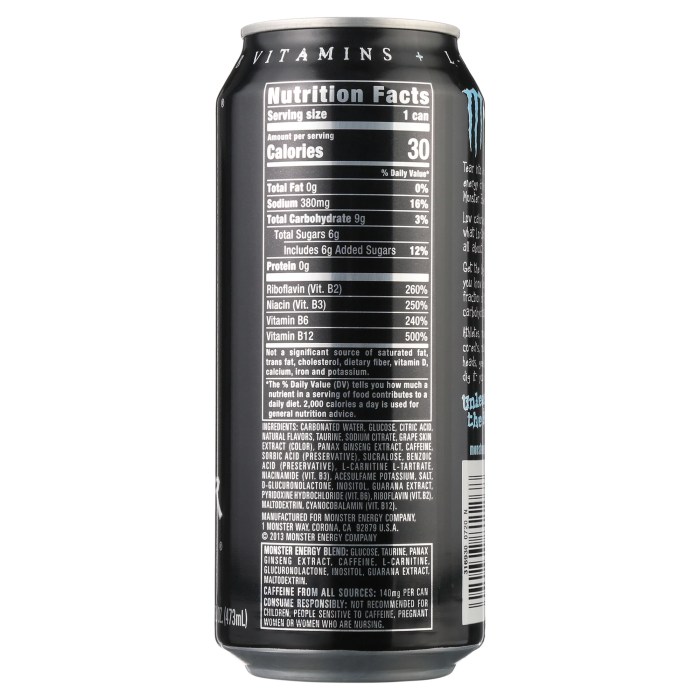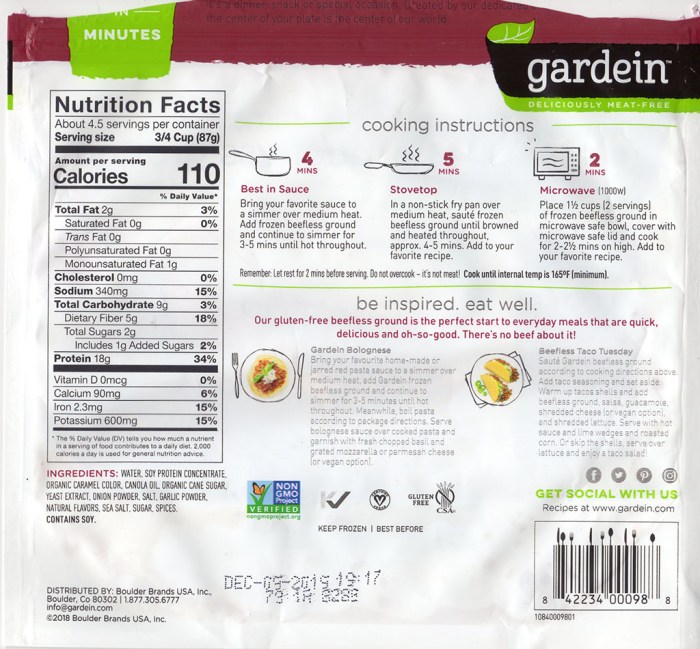Nutritional Information Breakdown

Monster energy drink nutrition facts – Yo, Surabaya kids! Let’s get real about what’s actually in that Monster you’re chugging. We’re breaking down the nutrition facts, so you know exactly what you’re putting in your body. No sugarcoating (pun intended!).
This isn’t your grandma’s jamu; Monster Energy is packed with a punch, and that punch comes with a nutritional profile. Understanding this profile is key to making informed choices about your energy drink consumption.
Nutritional Content of a Standard Can of Monster Energy
Here’s the lowdown on the nutritional information for a typical 500ml can of Monster Energy. Remember, these numbers can vary slightly depending on the specific flavor.
| Serving Size | Calories | Total Fat | Carbohydrates | Sugars | Protein | Caffeine |
|---|---|---|---|---|---|---|
| 500ml | 210 | 0g | 54g | 54g | 0g | 160mg |
Visual Representation of Macronutrient Proportions, Monster energy drink nutrition facts
Imagine a pie chart. The entire pie represents the total calories in a single can of Monster. The vast majority of the pie, maybe around 80%, would be a vibrant, sugary-sweet red slice representing carbohydrates, mostly from sugar. A tiny sliver, practically invisible, would represent fat (0g). There’s no protein, so there’s no slice for that.
The remaining small slice would represent the other components that contribute to the overall calorie count.
Monster Energy drinks, notorious for their sugar content, often leave consumers wondering about the nutritional breakdown. For a different perspective on ready-to-drink beverages, check out the details on twisted tea nutrition facts ; comparing the two highlights the significant differences in caloric and sugar content. Ultimately, understanding both Monster and Twisted Tea’s nutritional profiles helps make informed choices about your daily intake.
Impact of Nutritional Content on Different Groups
The high sugar and caffeine content of Monster Energy has different implications for various groups of people. Let’s be clear, this isn’t a health drink, it’s an energy boost, and it should be treated as such.
Athletes: While athletes might use it for a quick energy boost during intense training, the high sugar content can lead to energy crashes and isn’t ideal for sustained performance. They’d be better off with healthier hydration and energy sources. Think of it like this: a quick sprint vs a marathon. Monster is good for the sprint, but not the marathon.
Children: Monster is definitely a no-go for kids. Their bodies are still developing, and the high sugar and caffeine content can negatively impact their growth, sleep patterns, and overall health. It’s like giving them a caffeine overdose before a school exam; not a good idea!
Pregnant Women: Pregnant women should avoid Monster Energy. The caffeine can cross the placenta and affect the fetus, and the high sugar levels aren’t beneficial for either the mother or the baby. Think about it: you’re nourishing a growing human being; Monster is not the right kind of nourishment.
Caffeine Content and Effects

Yo, Surabaya kids! Let’s get real about that Monster Energy in your hand. We all know the buzz, but what’sreally* going on inside that can? We’re diving deep into the caffeine – the good, the bad, and the downright scary.A standard 500ml can of Monster typically packs around 160mg of caffeine. That’s a serious jolt. To put that in perspective, a regular cup of brewed coffee (around 240ml) usually has between 95-200mg, while a cup of black tea might contain 30-50mg.
So, yeah, Monster’s a caffeine powerhouse.
Caffeine’s Impact on the Body
Caffeine’s a powerful stimulant. It affects your brain and body in various ways, some good, some not so good. Understanding these effects is key to enjoying your energy drink responsibly.
- Increased Alertness and Focus: Caffeine blocks adenosine, a neurotransmitter that promotes sleepiness. This leads to that familiar “wake-up” effect, improved concentration, and faster reaction times. Think of it as hitting the turbo button on your brain.
- Elevated Mood: Caffeine can trigger the release of dopamine, a neurotransmitter associated with pleasure and reward. This can lead to a temporary mood boost and feeling of well-being. It’s that “feel-good” factor.
- Increased Energy and Physical Performance: Caffeine can boost your energy levels and improve athletic performance by increasing adrenaline and mobilizing fatty acids for fuel. Think crushing that futsal game after a Monster.
- Increased Heart Rate and Blood Pressure: This is where things can get dicey. Caffeine stimulates your nervous system, leading to a faster heartbeat and higher blood pressure. This is generally temporary but can be problematic for individuals with pre-existing heart conditions.
- Diuretic Effect: Caffeine acts as a diuretic, increasing urine production. This can lead to dehydration if you’re not drinking enough water, especially during physical activity. Remember to stay hydrated, especially after a workout.
- Sleep Disruption: Consuming caffeine too late in the day can interfere with your sleep cycle, leading to insomnia and daytime fatigue. This is especially true for sensitive individuals.
Risks of Excessive Caffeine Consumption
Too much of a good thing can be a bad thing. Overdoing the caffeine can lead to some serious issues.
- Anxiety and Jitters: High doses of caffeine can cause anxiety, nervousness, and the “jitters” – that uncontrollable shaking feeling.
- Insomnia: We already talked about this, but it’s worth repeating. Caffeine late in the day = trouble sleeping.
- Headaches: Both caffeine withdrawal and excessive caffeine intake can trigger headaches.
- Upset Stomach: Too much caffeine can irritate your stomach lining, leading to nausea or indigestion.
- Heart Palpitations: This is a more serious issue and can indicate an irregular heartbeat.
- Dehydration: As mentioned earlier, caffeine’s diuretic effect can lead to dehydration if not balanced with sufficient water intake.
Recommended Caffeine Intake
The general recommendation is to limit your daily caffeine intake to around 400mg. This is a guideline, and individual tolerance varies. Pay attention to your body’s response. If you’re experiencing negative effects, cut back. Listen to your body, especially if you have any underlying health conditions.
Remember, moderation is key!
Answers to Common Questions: Monster Energy Drink Nutrition Facts
Does Monster Energy contain artificial sweeteners?
No, Monster Energy typically uses sugar as its primary sweetener.
Can I drink Monster Energy daily?
Daily consumption is generally not recommended due to the high caffeine and sugar content. Moderation is key.
Are there any interactions between Monster Energy and medications?
Yes, caffeine can interact with certain medications. Consult your doctor if you have concerns.
Is Monster Energy suitable for diabetics?
Due to its high sugar content, Monster Energy is not recommended for individuals with diabetes unless under strict medical supervision.


